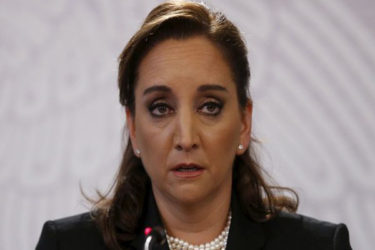MEXICO CITY, (Reuters) – Mexico said yesterday it will not pay for a border wall after Donald Trump’s surprise U.S. presidential election win and local authorities held off announcing any emergency financial measures to support the peso after the currency hit record lows overnight.
As Trump forged toward victory, the peso plunged 13 percent in its biggest fall in 22 years. It then pared losses to trade down 8.9 percent at 19.95 per dollar.
Trump’s threats to rip up a free trade agreement with Mexico and to tax money sent home by migrants to pay for building a wall on the southern U.S. border have made the peso particularly vulnerable to events in the race for the White House.
“Very hard times are coming to Mexico,” said analyst Gabriela Siller of Mexican bank BASE.

Ratings agency Fitch said Trump’s victory increased economic uncertainty for Mexico and may add downside risks to economic growth.
Analysts said the peso had been able to recover from its record low after Trump took a measured tone in his victory speech and did not invoke any of his threats against Mexico.
“The market has calmed down a bit and given the benefit of doubt to a more conciliatory Trump,” said Marco Oviedo, an economist at Barclays in Mexico City.
President Enrique Pena Nieto said on Twitter he was ready to work with Trump, calling the neighboring countries friends who “should continue to work together for the competitiveness and development of North America”.
But Mexican Foreign Minister Claudia Ruiz Massieu said yesterday the country’s government would not pay for Trump’s proposed wall along the U.S. border. Trump’s threat that Mexico will pay for the wall had become a key feature of his stump speeches.
Several economists had expected a snap interest rate hike, but central bank Governor Agustin Carstens told a news conference yesterday morning the bank would take any necessary measures pending market conditions.
He said it would hold a monetary policy meeting as scheduled on Nov. 17, but did not announce any immediate steps to support the currency.
Mexico has already raised its benchmark interest rate three times this year to support the peso.
Analysts said the announcement of a press conference yesterday morning by monetary authorities after Trump’s victory had built up expectations of further policy action.
“It was a mistake on their behalf, an expectations management mistake. The cumulative depreciation of the currency would have been a bit less if they had raised interest rates,” said Koon Chow, and emerging markets strategist at UBP Asset Management in London.
As Trump appeared to be heading to victory on Tuesday, five Mexican-based economists had told Reuters they expected the central bank to raise its benchmark interest rate by an impromptu 75 to 150 basis points yesterday.
Mexican Finance Minister Jose Antonio Meade said that authorities were monitoring the situation and that they would act if needed.
“It is important to recognize that market operations have remained ordered. This has been seen in the last hours,” Meade said.
The central bank last hiked its key rate in September by 50 basis points, lifting it to 4.75 percent to anchor inflation expectations following a sharp depreciation of the peso.
Mexico has more than $175 billion in foreign reserves, and Carstens said last month he would consider using a $90 billion International Monetary Fund flexible credit line “in the event of an external shock.”
Trump’s win caught the market off guard. The peso rallied nearly 1.4 percent on Tuesday before official election results began to be released as the market bet Clinton would win.





